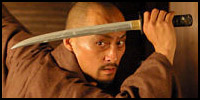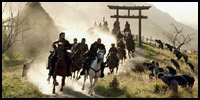
 |
|
The Last Samurai (2003) Cast: Tom Cruise, Ken Watanabe, Koyuki, Timothy Spall, Tony Goldwyn, Hiroyuki Sanada, Billy Connolly, Shichinosuke Nakamura, William Atherton, Chad Lindberg, Sosuke Ikematsu, Aoi Minato 2003 – 144 minutes Rated: Reviewed by Dustin Putman, December 5, 2003.  Directed by Edward Zwick (1998's "The Siege"), "The Last Samurai" plays like a shallow, cut-rate version of his 1989 Civil War masterpiece, "Glory." An epic love letter to the Japanese samurai culture, the film's well-meaning ideology ultimately collapses in a film that falls victim to muddled storytelling and thinly drawn characters whom we never get a firm grasp on. When all is said and done, only some beautifully photographed, CGI-enhanced vistas (courtesy of cinematographer John Toll) and a stunning climactic battle sequence manage to stand out.
Directed by Edward Zwick (1998's "The Siege"), "The Last Samurai" plays like a shallow, cut-rate version of his 1989 Civil War masterpiece, "Glory." An epic love letter to the Japanese samurai culture, the film's well-meaning ideology ultimately collapses in a film that falls victim to muddled storytelling and thinly drawn characters whom we never get a firm grasp on. When all is said and done, only some beautifully photographed, CGI-enhanced vistas (courtesy of cinematographer John Toll) and a stunning climactic battle sequence manage to stand out.
 Opening in 1876 San Francisco, Nathan Algren (Tom Cruise) is a sad, boozy former Civil War hero who has lost direction in his life. When he is offered a grand sum of money he can't refuse, Nathan finds himself traveling to Japan to teach modern warfare to the Emperor's (Shichinosuke Nakamura) troops, who wish to stop the renegade tactics of nearby samurai rebels led by Katsumoto (Ken Watanabe). When their face-off goes awry, Nathan is spared from death and held captive in the samurai village. Finding himself living with Katsumoto's resentful sister, Taka (Koyuki), whose husband he killed on the battlefield, Nathan gradually becomes sympathetic to the samurai's cause—that of stopping the rising modernism in Japan—and enraptured in their way of life. When he is finally given the chance to return to Tokyo and pick up his prior commission following the winter months of 1876 and early 1877, Nathan has changed so much in his viewpoints that he is unsure of what to do: resume a job commitment that will give him money, or swap sides and risk his life for something he actually believes in.
Opening in 1876 San Francisco, Nathan Algren (Tom Cruise) is a sad, boozy former Civil War hero who has lost direction in his life. When he is offered a grand sum of money he can't refuse, Nathan finds himself traveling to Japan to teach modern warfare to the Emperor's (Shichinosuke Nakamura) troops, who wish to stop the renegade tactics of nearby samurai rebels led by Katsumoto (Ken Watanabe). When their face-off goes awry, Nathan is spared from death and held captive in the samurai village. Finding himself living with Katsumoto's resentful sister, Taka (Koyuki), whose husband he killed on the battlefield, Nathan gradually becomes sympathetic to the samurai's cause—that of stopping the rising modernism in Japan—and enraptured in their way of life. When he is finally given the chance to return to Tokyo and pick up his prior commission following the winter months of 1876 and early 1877, Nathan has changed so much in his viewpoints that he is unsure of what to do: resume a job commitment that will give him money, or swap sides and risk his life for something he actually believes in.
 "The Last Samurai" wishes to deem the importance of loyalty, standing by your comrades, and dying for a meaningful cause, but it is a questionable message the film fails to persuade the viewer on. Even at a hefty running time of nearly two-and-a-half hour, it is amazing how little depth or passion is brought to any of it. The predicament that lies before Nathan and the samurai warriors is laid out solely on the surface and not satisfactorily developed. Why, really, does Nathan garner an affinity for the samurai culture, going as far as learning fluent Japanese in a matter of a couple months? Writer-director Edward Zwick and co-writers John Logan and Marshall Herskovitz never salvage a plausible explanation for it. And why should viewers side with them and actually care about the outcome of the fight when the culture was more emphatically and poignantly displayed even in only a few wordless sequences in 2003's "Lost in Translation?" "The Last Samurai" is so built on common Hollywood movie cliches and superficial, jingoistic messages that it achieves no identity of its own.
"The Last Samurai" wishes to deem the importance of loyalty, standing by your comrades, and dying for a meaningful cause, but it is a questionable message the film fails to persuade the viewer on. Even at a hefty running time of nearly two-and-a-half hour, it is amazing how little depth or passion is brought to any of it. The predicament that lies before Nathan and the samurai warriors is laid out solely on the surface and not satisfactorily developed. Why, really, does Nathan garner an affinity for the samurai culture, going as far as learning fluent Japanese in a matter of a couple months? Writer-director Edward Zwick and co-writers John Logan and Marshall Herskovitz never salvage a plausible explanation for it. And why should viewers side with them and actually care about the outcome of the fight when the culture was more emphatically and poignantly displayed even in only a few wordless sequences in 2003's "Lost in Translation?" "The Last Samurai" is so built on common Hollywood movie cliches and superficial, jingoistic messages that it achieves no identity of its own.
 The relationship that builds between Nathan and Katsumoto, first of intolerance and then of keen understanding, should have been the heart of the story but comes off as little more than an afterthought. There is no genuine soul to their scenes together, only a spew of wannabe-existentialist conversations that would be right at home in Terrence Malick's staggering 1998 war drama, "The Thin Red Line," if they didn't lack that film's achieved profundity. Likewise, the borderline-embarrassing romantic subplot between Nathan and Taka offers no reason for why these two have an attraction or human connection for each other. Their love story is nothing more than sheepish sideway glances and no heart. Other relationships, including the strained one between Nathan and his former commander, Col. Benjamin Bagly (Tony Goldwyn), and another between Nathan and a British translator-photojournalist (Timothy Spall), are vapidly rendered.
The relationship that builds between Nathan and Katsumoto, first of intolerance and then of keen understanding, should have been the heart of the story but comes off as little more than an afterthought. There is no genuine soul to their scenes together, only a spew of wannabe-existentialist conversations that would be right at home in Terrence Malick's staggering 1998 war drama, "The Thin Red Line," if they didn't lack that film's achieved profundity. Likewise, the borderline-embarrassing romantic subplot between Nathan and Taka offers no reason for why these two have an attraction or human connection for each other. Their love story is nothing more than sheepish sideway glances and no heart. Other relationships, including the strained one between Nathan and his former commander, Col. Benjamin Bagly (Tony Goldwyn), and another between Nathan and a British translator-photojournalist (Timothy Spall), are vapidly rendered.
 Tom Cruise (2002's "Minority Report") has never given a bad performance, and his take on Nathan is no exception. Cruise ably provides a conflicted intensity to his role of a man who has been emotionally lost for so long he has forgotten what it means to be passionate about something; it is too bad, then, that the thing that breaks him of this affliction—his run-in with the samurai culture—is so effectively inert. As Taka, who speaks all of about five or six lines in the whole movie, Koyuki is a pretty face who knows how to make pensive expressions and not much else. Strangely, the American-Japanese romance between Nathan and Taka somewhat recalls and monumentally pales in comparison to the far more powerful one between Ethan Hawke and Youki Kudoh in 1999's exquisite "Snow Falling on Cedars."
Tom Cruise (2002's "Minority Report") has never given a bad performance, and his take on Nathan is no exception. Cruise ably provides a conflicted intensity to his role of a man who has been emotionally lost for so long he has forgotten what it means to be passionate about something; it is too bad, then, that the thing that breaks him of this affliction—his run-in with the samurai culture—is so effectively inert. As Taka, who speaks all of about five or six lines in the whole movie, Koyuki is a pretty face who knows how to make pensive expressions and not much else. Strangely, the American-Japanese romance between Nathan and Taka somewhat recalls and monumentally pales in comparison to the far more powerful one between Ethan Hawke and Youki Kudoh in 1999's exquisite "Snow Falling on Cedars."
 Even with its confused messages of sacrifice and loyalty during war, the climactic battle sequence between the Emperor's forces and the samurai warriors is a technical triumph of cinematography and editing that captures one's attention and doesn't let go. It also holds the film's most hauntingly poetic shot, which the title blatantly foreshadows. Unfortunately, what comes in the 100-plus minutes before this enrapturing 30-minute conclusion is not worth the time or the wait. "The Last Samurai" wants to be a cogent, contemplative Oscar contender, and makes no bones about it. The result is something quite different, however, sinking even as it cluelessly wears its unconvincing, paper-thin emotions on its sleeve.
Even with its confused messages of sacrifice and loyalty during war, the climactic battle sequence between the Emperor's forces and the samurai warriors is a technical triumph of cinematography and editing that captures one's attention and doesn't let go. It also holds the film's most hauntingly poetic shot, which the title blatantly foreshadows. Unfortunately, what comes in the 100-plus minutes before this enrapturing 30-minute conclusion is not worth the time or the wait. "The Last Samurai" wants to be a cogent, contemplative Oscar contender, and makes no bones about it. The result is something quite different, however, sinking even as it cluelessly wears its unconvincing, paper-thin emotions on its sleeve.
|
© 2003 by Dustin Putman |














